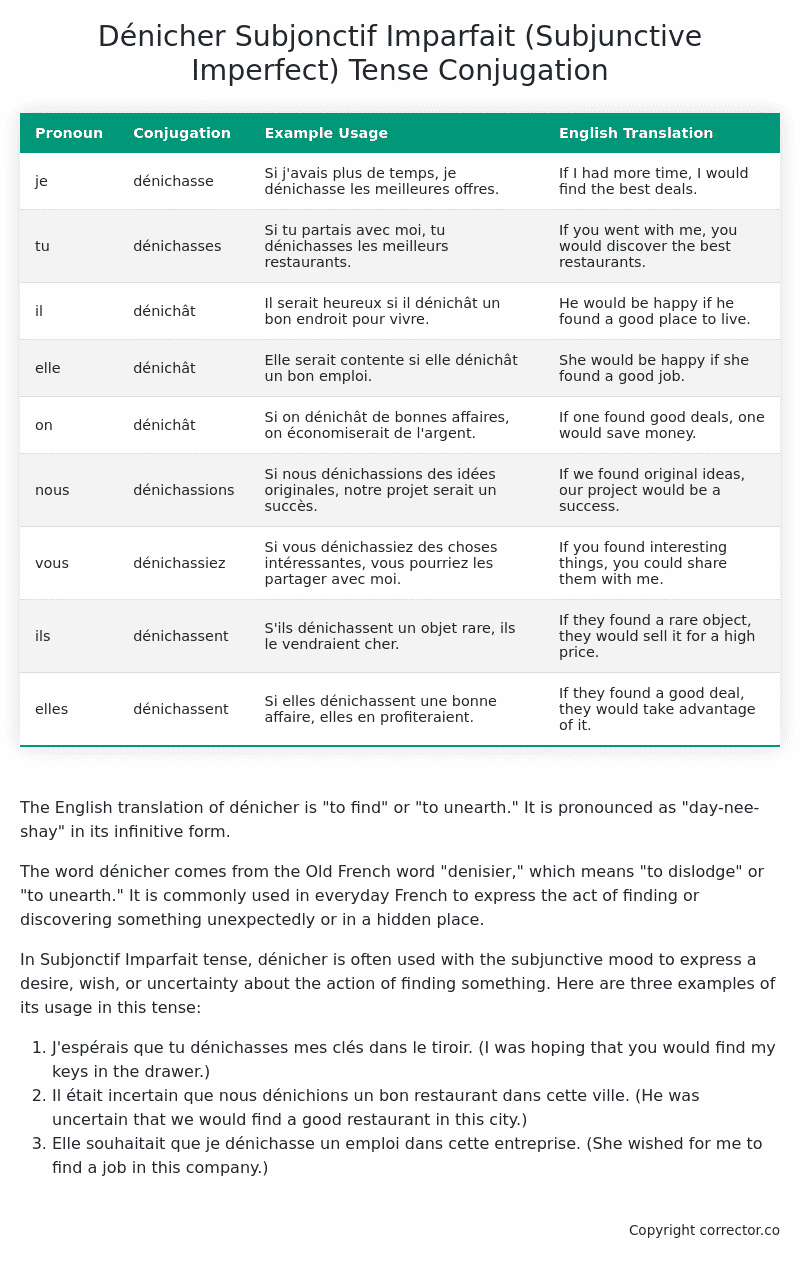Subjonctif Imparfait (Subjunctive Imperfect) Tense Conjugation of the French Verb dénicher
Introduction to the verb dénicher
The English translation of dénicher is “to find” or “to unearth.” It is pronounced as “day-nee-shay” in its infinitive form.
The word dénicher comes from the Old French word “denisier,” which means “to dislodge” or “to unearth.” It is commonly used in everyday French to express the act of finding or discovering something unexpectedly or in a hidden place.
In Subjonctif Imparfait tense, dénicher is often used with the subjunctive mood to express a desire, wish, or uncertainty about the action of finding something. Here are three examples of its usage in this tense:
- J’espérais que tu dénichasses mes clés dans le tiroir. (I was hoping that you would find my keys in the drawer.)
- Il était incertain que nous dénichions un bon restaurant dans cette ville. (He was uncertain that we would find a good restaurant in this city.)
- Elle souhaitait que je dénichasse un emploi dans cette entreprise. (She wished for me to find a job in this company.)
Table of the Subjonctif Imparfait (Subjunctive Imperfect) Tense Conjugation of dénicher
| Pronoun | Conjugation | Example Usage | English Translation |
|---|---|---|---|
| je | dénichasse | Si j’avais plus de temps, je dénichasse les meilleures offres. | If I had more time, I would find the best deals. |
| tu | dénichasses | Si tu partais avec moi, tu dénichasses les meilleurs restaurants. | If you went with me, you would discover the best restaurants. |
| il | dénichât | Il serait heureux si il dénichât un bon endroit pour vivre. | He would be happy if he found a good place to live. |
| elle | dénichât | Elle serait contente si elle dénichât un bon emploi. | She would be happy if she found a good job. |
| on | dénichât | Si on dénichât de bonnes affaires, on économiserait de l’argent. | If one found good deals, one would save money. |
| nous | dénichassions | Si nous dénichassions des idées originales, notre projet serait un succès. | If we found original ideas, our project would be a success. |
| vous | dénichassiez | Si vous dénichassiez des choses intéressantes, vous pourriez les partager avec moi. | If you found interesting things, you could share them with me. |
| ils | dénichassent | S’ils dénichassent un objet rare, ils le vendraient cher. | If they found a rare object, they would sell it for a high price. |
| elles | dénichassent | Si elles dénichassent une bonne affaire, elles en profiteraient. | If they found a good deal, they would take advantage of it. |
Other Conjugations for Dénicher.
Le Present (Present Tense) Conjugation of the French Verb dénicher
Imparfait (Imperfect) Tense Conjugation of the French Verb dénicher
Passé Simple (Simple Past) Tense Conjugation of the French Verb dénicher
Passé Composé (Present Perfect) Tense Conjugation of the French Verb dénicher
Futur Simple (Simple Future) Tense Conjugation of the French Verb dénicher
Futur Proche (Near Future) Tense Conjugation of the French Verb dénicher
Plus-que-parfait (Pluperfect) Tense Conjugation of the French Verb dénicher
Passé Antérieur (Past Anterior) Tense Conjugation of the French Verb dénicher
Futur Antérieur (Future Anterior) Tense Conjugation of the French Verb dénicher
Subjonctif Présent (Subjunctive Present) Tense Conjugation of the French Verb dénicher
Subjonctif Passé (Subjunctive Past) Tense Conjugation of the French Verb dénicher
Subjonctif Imparfait (Subjunctive Imperfect) Tense Conjugation of the French Verb dénicher (this article)
Subjonctif Plus-que-parfait (Subjunctive Pluperfect) Tense Conjugation of the French Verb dénicher
Conditionnel Présent (Conditional Present) Tense Conjugation of the French Verb dénicher
Conditionnel Passé (Conditional Past) Tense Conjugation of the French Verb dénicher
L’impératif Présent (Imperative Present) Tense Conjugation of the French Verb dénicher
L’infinitif Présent (Infinitive Present) Tense Conjugation of the French Verb dénicher
Struggling with French verbs or the language in general? Why not use our free French Grammar Checker – no registration required!
Get a FREE Download Study Sheet of this Conjugation 🔥
Simply right click the image below, click “save image” and get your free reference for the dénicher Subjonctif Imparfait tense conjugation!

Dénicher – About the French Subjonctif Imparfait (Subjunctive Imperfect) Tense
Formation
Common Everyday Usage Patterns
Interactions with Other Tenses
Subjonctif Présent
Indicatif Passé Composé
Conditional
Conditional Perfect
Summary
I hope you enjoyed this article on the verb dénicher. Still in a learning mood? Check out another TOTALLY random French verb conjugation!


